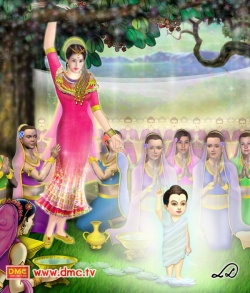Difference between revisions of "Anicca"
| Line 2: | Line 2: | ||
'''[[anicca]]''': Inconstant; unsteady; [[impermanent]].[[Wikipedia:Impermanence|Anicca]] ([[Pali]]); [[impermanence]] is one of the [[essential]] [[doctrines]] or [[Three characteristics of existence]] in [[Buddhism]]. The term expresses the [[Buddhist]] notion that every [[conditioned existence]], without exception, is inconstant and in flux, even [[gods]]. | '''[[anicca]]''': Inconstant; unsteady; [[impermanent]].[[Wikipedia:Impermanence|Anicca]] ([[Pali]]); [[impermanence]] is one of the [[essential]] [[doctrines]] or [[Three characteristics of existence]] in [[Buddhism]]. The term expresses the [[Buddhist]] notion that every [[conditioned existence]], without exception, is inconstant and in flux, even [[gods]]. | ||
| − | According to the [[impermanence]] [[doctrine]], [[Wikipedia:Human life|human life]] [[embodies]] this flux in the [[aging process]], the cycle of | + | According to the [[impermanence]] [[doctrine]], [[Wikipedia:Human life|human life]] [[embodies]] this flux in the [[aging process]], the [[cycle of birth and rebirth]] ([[samsara]]), and in any [[experience]] of loss. The [[doctrine]] further asserts that because things are [[impermanent]], [[attachment]] to them is futile, and leads to [[suffering]] ([[dukkha]]). Under the [[impermanence]] [[doctrine]], all [[compounded]] and [[constructed]] things and states are [[impermanent]]. |
[[Buddhists]] hold that the only true end of [[impermanence]] is [[nibbana]], the [[Wikipedia:reality|reality]] that [[knows]] no change, [[decay]] or [[death]]. | [[Buddhists]] hold that the only true end of [[impermanence]] is [[nibbana]], the [[Wikipedia:reality|reality]] that [[knows]] no change, [[decay]] or [[death]]. | ||
Revision as of 11:55, 29 January 2015
anicca: Inconstant; unsteady; impermanent.Anicca (Pali); impermanence is one of the essential doctrines or Three characteristics of existence in Buddhism. The term expresses the Buddhist notion that every conditioned existence, without exception, is inconstant and in flux, even gods.
According to the impermanence doctrine, human life embodies this flux in the aging process, the cycle of birth and rebirth (samsara), and in any experience of loss. The doctrine further asserts that because things are impermanent, attachment to them is futile, and leads to suffering (dukkha). Under the impermanence doctrine, all compounded and constructed things and states are impermanent.
Buddhists hold that the only true end of impermanence is nibbana, the reality that knows no change, decay or death.
Impermanence is intimately associated with the doctrine of anatta, according to which things have no fixed nature, essence, or self.
